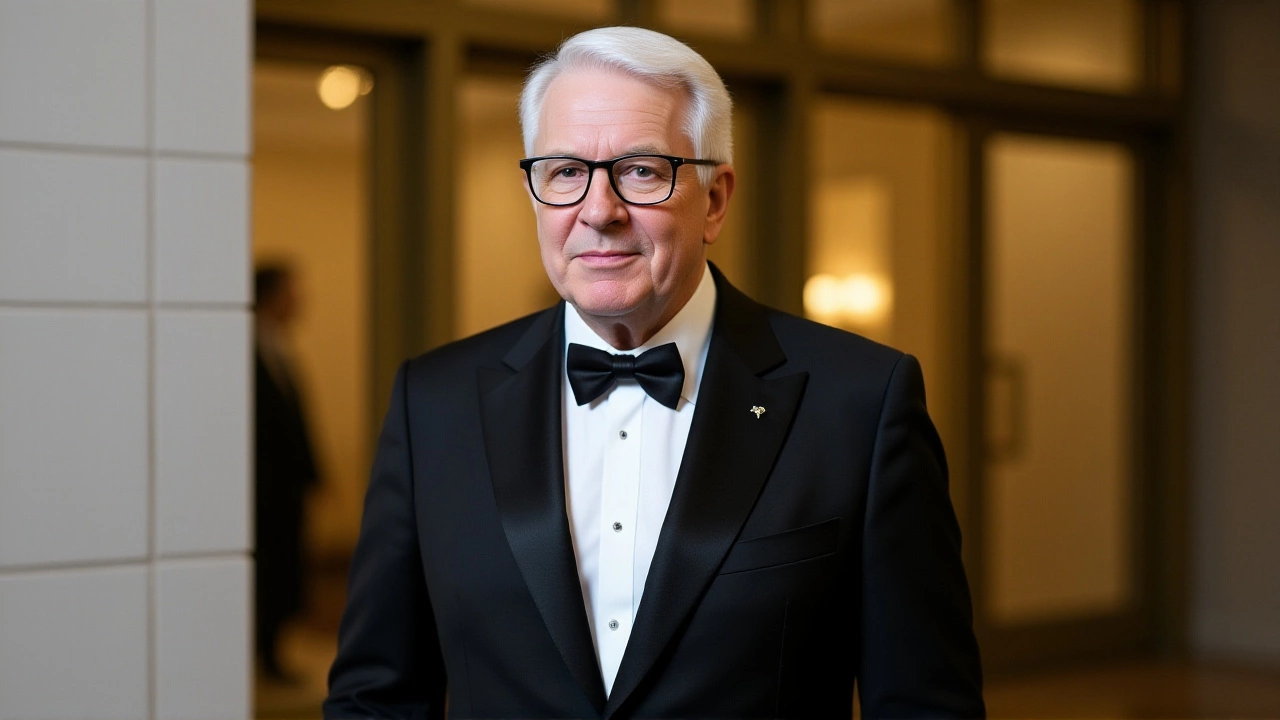When Steve Martin paused mid-interview to declare C.D. Bales his favorite role ever, the room didn’t just laugh—it exhaled. It was November 24, 2025, in a quiet corner of a New York studio, with Selena Gomez and Martin Short watching as the 78-year-old legend didn’t just pick a character—he resurrected a piece of his soul. "Roxanne. C.D. Bales," he said, without blinking. Short, stammering, tried to respond. Martin grinned. "I’ll raise my hand while you’re thinking." It wasn’t just a joke. It was a confession.
The Fire Chief Who Changed Everything
Roxanne Hollywood didn’t just come out in 1987—it arrived like a thunderclap in a world still clinging to broad slapstick. Martin didn’t just star in it; he wrote every draft—25 of them—over three years, wrestling with Edmond Rostand’s 1897 tragedy Cyrano de Bergerac until he made it his own. The original ends with Cyrano dying alone, his love unspoken. Martin’s version? C.D. Bales, the fire chief with the nose like a misplaced monument, gets the girl. Not because he’s handsome. Not because he’s lucky. But because he’s honest. And funny. And devastatingly kind.The role wasn’t just a performance—it was a redemption. Martin, who’d spent the 1970s as a surreal stand-up comic with a banjo, had been typecast as the absurd. But C.D. Bales? He was the man who could deliver a deadpan insult to a drunk in a bar, then turn around and whisper poetry to the woman he loved. The scene where Bales and the bar patron trade escalating insults—Martin turning a violent moment from the play into a rhythmic, hilarious duel—became legendary. "It showed," wrote Collider, "that Martin’s best comedy often came from subtlety. The film works because of how emotionally articulate his performance is."
A Career of Characters, But Only One Favorite
Let’s be clear: Martin has played a lot of memorable people. Navin R. Johnson from The Jerk (1979) was the clueless everyman who became a cultural touchstone. Del Griffith in Planes, Trains and Automobiles (1987) was the lovable, nasal-voiced annoyance who somehow made you cry. Lucky Day in Three Amigos! (1986)? Pure, over-the-top charm. He even gave us a clueless Inspector Jacques Clouseau in the 2006 Pink Panther reboot. And let’s not forget his voice as the smug Egyptian god Hotep in The Prince of Egypt (1998)—a role that made kids laugh and parents appreciate the irony.
But none of them, Martin insists, had the weight of C.D. Bales. "He had a lot of energy," Martin told Vogue. "And he was real. Not a caricature. Not a gag. He was a man who loved someone so much he helped him win her." That’s the thing about Bales—he’s not just funny. He’s brave. He risks humiliation daily, not for applause, but because he believes in love. Even when it’s not his to claim.

The Quiet Triumph of a Screenplay
What most people forget: Martin didn’t just act in Roxanne. He wrote it. And he won the Writers’ Guild Award for Best Adapted Screenplay for it. That’s rare. Even rarer: he did it while juggling stand-up tours and TV appearances. The film cost $13 million. It made $34.8 million domestically. Critics adored it—94% on Rotten Tomatoes, based on 32 reviews. But the real victory? It proved a man with a big nose could be the most romantic figure on screen.
Stanley Kubrick once wanted Martin for Eyes Wide Shut—a role that never materialized. But Martin didn’t need Kubrick’s approval. He already had his masterpiece.
Legacy Beyond the Screen
Martin’s career isn’t just films. He’s written a memoir—Born Standing Up: A Comic’s Life—that’s required reading for anyone who wants to understand the loneliness behind laughter. He’s composed bluegrass music. He’s painted. He’s played the banjo at the White House. He’s not just an entertainer—he’s an artist who refuses to be boxed in.
And yet, when asked to pick his favorite, he didn’t choose the Oscar-nominated drama of Grand Canyon (1991), or the Hitchcockian tension of The Spanish Prisoner (1997). He chose a fire chief who couldn’t say "I love you"—so he wrote love letters instead.

What Happened After?
Now, at 78, Martin still works. Only Murders in the Building, the Hulu series he co-created with John Hoffman and Dan Fogelman, is entering its fourth season. He’s still writing. Still performing. Still laughing. But when he talks about C.D. Bales, something shifts. His voice softens. His eyes get that look—the one that says he’s remembering a moment no one else saw.
Maybe that’s why it’s his favorite. Not because it was the biggest hit. Not because it won awards. But because it was the only role where he got to be both the fool and the hero. And somehow, that’s the most human thing of all.
Frequently Asked Questions
Why did Steve Martin choose C.D. Bales over other iconic roles like Navin R. Johnson or Del Griffith?
Martin has called C.D. Bales the only character he wrote for himself—not just as a performer, but as a man. While Navin and Del were outwardly absurd, Bales carried quiet vulnerability. Martin revealed in interviews that he saw himself in Bales’s loneliness and courage, making it emotionally personal rather than just comedic. The role allowed him to blend humor with genuine heartbreak, something he hadn’t fully achieved before.
How did the original play 'Cyrano de Bergerac' influence 'Roxanne'?
Martin kept the core of Rostand’s story—the intelligent, eloquent man with a physical flaw who helps a more handsome rival woo the woman he loves—but flipped the ending. Instead of tragedy, he gave Bales a happy resolution: he confesses his love, and Roxanne chooses him. This shift reflected Martin’s belief that comedy should offer hope, not just laughter. The adaptation also modernized the setting, replacing 19th-century Paris with a small American town, making the emotional stakes feel immediate.
What was the critical and commercial reception of 'Roxanne'?
Upon release in June 1987, 'Roxanne' earned a 94% approval rating on Rotten Tomatoes from 32 critics and grossed $34.8 million domestically against a $13 million budget. Martin won the Writers’ Guild Award for Best Adapted Screenplay, and the film was praised for its emotional depth and sharp dialogue. It’s now considered one of the most enduring romantic comedies of the 1980s, often cited for its balance of wit and tenderness.
Why did Martin Short struggle to name his favorite character during the Vogue interview?
Martin Short, known for his rapid-fire improvisation, was caught off guard by the emotional weight of the question. When he tentatively suggested a role, Martin dismissed it with a joke about Short’s 1989 HBO special character Dale O’Day—a sentient fence. Short, born in 1950, knew the reference; Gomez, born in 1992, didn’t. The moment highlighted how Martin’s career spans generations, and how some of his most personal work is lost on younger audiences.
Has Steve Martin ever spoken about C.D. Bales in other interviews?
Yes. In his 2007 memoir Born Standing Up, Martin called 'Roxanne' the most personally satisfying project of his career. He wrote that writing Bales felt like "giving voice to the part of me that always felt too much and said too little." He’s referenced the character in multiple interviews since, often noting how audiences still approach him on the street to quote Bales’s lines—especially the bar scene—proving the role’s lasting emotional resonance.
How does 'Roxanne' compare to Martin’s later work in 'Only Murders in the Building'?
While 'Only Murders' showcases Martin’s ability to blend mystery and melancholy, C.D. Bales remains his purest expression of romantic comedy. Bales is unapologetically hopeful; Martin’s character in 'Only Murders' is more guarded, haunted by past failures. Still, both roles share a quiet dignity. In both, Martin uses humor not to escape pain, but to face it—with grace, wit, and a little bit of heartbreak.
